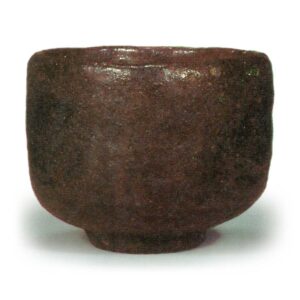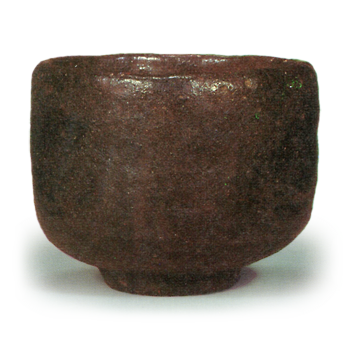
Specialty. Raku ware tea bowl, black, by Chojiro. The inscription is Sen-no-Rikyu’s inscription.
The name “Makomomo” was chosen for a tea bowl with the inscription “Shobu” by Sen no Rikyu, the same person who made this bowl. When Minamoto no San no Yorimasa was given an iris by a court lady, he was asked to choose one from a list of similar beauties, and the “Genpei Shorai-ki” tells us that he composed the poem, “In the May rain, the stone wall of a swamp is overflowed with irises. Based on this poem, Rikyu named one of the two tea bowls “Iris” and gave the other the name “Mamato” (meaning “straight” in Japanese), because both bowls were so well made that it was hard to decide which was the iris. The overall luster is poor, the coloring is subdued and unrefined, and the bowls themselves contain a sense of infinite loneliness. It is said to have been handed down from generation to generation as follows. Sen no Rikyu, Sen no Doan, Nakamura Sotetsu, Kusumi Soyasu (1657~, Meireki 3), Kyo Ehara Chushichi (1707~, Hoei 4), Izuminokuni Yakura Yoichi (1727~, Kyoho 12), Yamashita Yuuboe, Konoike Ihei (1822~, Bunsei 5), and later in the Fujita family. (Currently in the collection of the Fujita Museum of Art: Kokin Meimono Ruju, Raku Ware Meimono Chawan Shu, Chaji Shu, Honcho Pottery Novelogue, Taisho Meiki Kan.)



